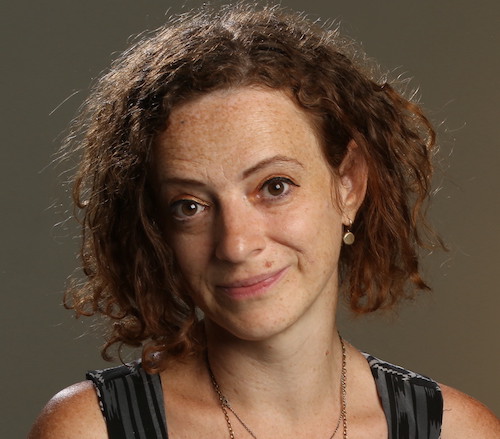While making Yours in Sisterhood, UC Santa Cruz professor and documentary filmmaker, Irene Lusztig, went to 32 states to film people reading and responding to letters sent to Ms. Magazine in the 1970s.
One of towns she went to was Richland, in Eastern Washington to meet Trisha Pritikin, who chose as her backdrop for reading her letter a huge logo of a mushroom cloud that covered the back wall of the high school.
That’s not the only sign of the town’s pride in its nuclear history — the high school sports teams are the Bombers, there’s a Proton Lane, and Richland celebrates an annual Atomic Frontier Day Parade.
The town was established in 1943 to provide housing for workers who manufactured plutonium at the nearby Hanford Nuclear Site for the “Fat Man” bomb the U.S. dropped on Nagasaki in World War II.
Lusztig’s latest documentary, Richland, tells the story of the town. It opened at Tribeca and at the prestigious International Documentary Festival Amsterdam, it was selected to be part of the program "Signed," (described as "The latest films by the most interesting contemporary filmmakers whose filmographies we highly appreciate, and for whose work we wait with excitement.”)
Lusztig wanted to know how people grappled with Richland’s history. Pritikin, whose father died of cancer and has had health problems herself, is an anti-nuclear activist she met, but many people she talked to like living in the town, and many of the next generation now work in nuclear clean-up.
“It was extremely well funded with high paying jobs because it was important government work,” she said. “It was built as a very idyllic suburban community for workers — the public library is beautiful, and the parks are super nicely maintained. It’s a very pleasant community and people have wonderful childhood memories of growing up there.”
She dug into the town’s archives, something she has done since making her first movie, Reconstruction, when she went to Romania to investigate the history of her grandmother who robbed a bank there. The Romanian government had made a propaganda film about it where Lusztig’s grandmother, along with others involved, were forced to reenact the crime. Lusztig spent a lot of time in the archives looking for that film and she fell in love with archival films and how they can be used.
The same way she asked the people in Sisterhood to read letters to Ms. Magazine out loud, in this movie, Lusztig asked some participants to read from a book of poems, Plume, written by a Richland native, Kathleen Flenniken.
Lusztig often invites people who are in her movies to watch it at different stages. She likes her work to be collaborative, wanting to build community and shift the balance of power.
“Every time a camera is there, there is some kind of performance. So just calling it a performance and making it performative is a way of, I think, making a more consensual space,” she said. “It feels like an invitation to make something together with someone rather than just pointing a camera at them.”
What she wanted to get at with the film was not only the environmental fallout for the town, but how we all ignore things we don’t want to think too much about.
“All of us live with a lot of denial every day, like ordering things from Amazon and not thinking about climate change,” she said. “There’s that kind of phenomenon of having a blind spot or living with some kind of denial or just not wanting to look at the whole of something that's really difficult to look at. That’s not specific to Richland.”



